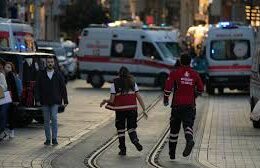Istanbul hosted the Turkish-Greek Media and Academy Forum on Thursday in collaboration between the Foundation for Türkiye Studies and the Institute of Global Affairs. The event saw a discussion of the role of media and academia in ties between the two neighbors, which have been thawing recently.
In his opening speech at a panel titled “The Role of Media in Turkish-Greek Relations,” professor Enes Bayraklı, deputy chairperson of the Foundation for Türkiye Studies, said there are significant problems in Turkish-Greek relations, ranging from the Aegean to the Eastern Mediterranean and minority issues, which cannot be denied. Bayraklı pointed out that these issues have caused tensions between the two countries. He commended the leaders of both countries for managing the issues that have prevented them from escalating into a heated conflict.
He said both countries could move beyond these problems. To achieve this, he emphasized the need for extensive efforts in various areas, including the cultural, academic and media sectors. Bayraklı said they organized this event to contribute positively to the field. He said the forum’s first panel would discuss how collaboration in the media field could be achieved, and the second panel would explore positive projects in the academic field.
Yusuf Özhan, deputy general manager and editor-in-chief of Anadolu Agency (AA), also spoke at the forum. He mentioned that they have been working with Athens News Agency for decades and had shared platforms and collaborated before signing a cooperation agreement between the two agencies. He highlighted the advantage of this collaboration in overcoming future challenges.
Özhan said that as AA, they strive to cover news from all around the world, including information about Türkiye and Greece. He pointed out that the shortage of personnel in the media sector has made the role of news agencies even more critical. He also noted that AA and Athens News Agency are not just a collaboration between two agencies but a societal relationship.
Bora Bayraktar, TRT World Channel coordinator, discussed the significant problems in Turkish-Greek relations that go beyond the media. He emphasized that their role as journalists is to report what is happening but that they cannot solve issues like the Cyprus problem, the Aegean dispute or the Turkish minority issue in Greece. Bayraktar said that several long-standing issues are on the agenda, but these are beyond their field. However, they can report on these issues responsibly.
He also said that despite many crises between the two countries in the past 30 years, there have been moments of cooperation and positive interactions. He recalled how Greek newspapers used Turkish headlines during the 1999 Marmara earthquake and stressed the importance of such positive moments. He said he had researched peace and conflict resolution for his doctoral thesis, studied peace journalism extensively and believed that a journalist’s role is solely to report the news, not to take on the responsibilities of politicians or ministers.
Aimilios Perdikaris, general manager of Athens News Agency, spoke about the cooperation opportunities the event had presented. He mentioned the challenging political environments but emphasized that the forum allows the media to find its path. Perdikaris said that working together, having discussions, respecting each other and collaborating in different areas are essential.
He pointed out the significance of addressing issues like climate change, which is crucial for both countries in the Mediterranean region, and emphasized the need to present such matters as unifying rather than divisive.
Source: Daily Sabah









